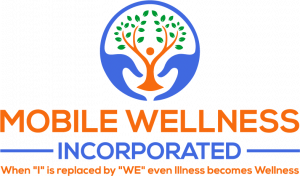
In an age of digital communication and constant connectivity, many people still feel deeply alone. Loneliness and social isolation have quietly become pressing public health concerns, especially in the wake of the COVID-19 pandemic. At Mobile Wellness Incorporated, we believe that one of the most powerful tools for improving mental health isn’t found in a prescription bottle, it’s found in human connection.
What Is Social Wellness?
Social wellness refers to the ability to form and maintain meaningful relationships with others. This includes friendships, family bonds, support networks, and community engagement. Social wellness is not just about the quantity of relationships, but the quality, feeling understood, supported, and valued (National Institutes of Health [NIH], 2023).
Positive social interactions play a protective role against mental health challenges. According to the Centers for Disease Control and Prevention (CDC, 2023), strong social connections reduce the risk of depression and anxiety, improve self-esteem, and even promote longer life expectancy.
The Mental Health Toll of Disconnection
Social isolation has serious consequences. The U.S. Surgeon General recently declared loneliness an epidemic, citing evidence that social disconnection is as harmful as smoking 15 cigarettes a day (Office of the Surgeon General, 2023). Those who lack supportive social relationships are more likely to experience:
- Chronic stress and inflammation
- Higher rates of depression and suicidal ideation
- Substance use and emotional dysregulation
- Cognitive decline and increased risk of dementia
Vulnerable populations, including older adults, people of color, individuals with disabilities, and members of the LGBTQ+ community, are often at higher risk of social isolation due to systemic inequities and stigma (Cacioppo & Cacioppo, 2018).
How Connection Heals the Brain
Human connection activates neural systems that reduce the stress response. Physical touch, eye contact, laughter, and empathy release oxytocin, the “bonding hormone,” which calms the nervous system and fosters feelings of trust and safety (Zulfiqar et al., 2021).
Meaningful social relationships also support cognitive and emotional regulation. Studies show that individuals with strong social support networks have lower cortisol levels and are better able to manage trauma, grief, and anxiety (Umberson & Montez, 2010).
In short, connection doesn’t just feel good, it is biologically healing.
Creating a Culture of Connection
At Mobile Wellness Incorporated, we embed social wellness into everything we do. Our mobile services, community events, and wellness workshops are designed to:
- Foster belonging through peer support and group therapy
- Encourage open dialogue around mental health and emotions
- Build trust in communities through consistent, compassionate care
- Empower individuals to build and maintain supportive relationships
We understand that healing happens best in connection, not isolation.
How You Can Support Social Wellness
Whether you’re a mental health advocate, a caregiver, or simply a compassionate human being, you can help nurture social wellness in your community:
- Check in regularly with friends, family, and neighbors
- Encourage vulnerable conversations about emotions and stress
- Join or create community groups, clubs, or volunteer circles
- Advocate for inclusive spaces where people feel safe and seen
- Remember that being present is often the most powerful gift
Final Thoughts
Mental health is not only an individual concern, but also a collective responsibility. By creating a culture that prioritizes social wellness, we can combat isolation, uplift communities, and foster resilience.
At Mobile Wellness Incorporated, we believe that connection is medicine, and everyone deserves access to its healing power.
